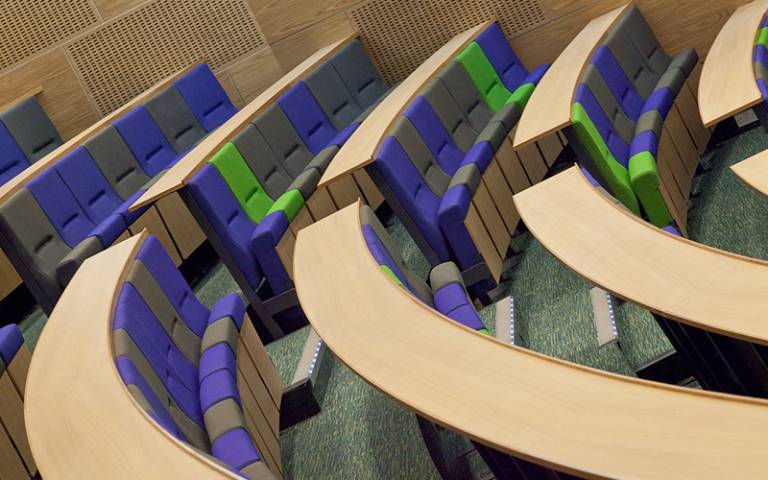£2M funding approved for improvements to teaching spaces
26 June 2019
We are beginning the second phase of the Timetabling Project. UCL Estates will also be delivering improvements across some of our existing teaching estate

Delivering an effective timetabling service is challenging.
This is due to a wide range of reasons including: the devolved nature of timetabling at UCL; lecturer availability; the range of programme diets; the timing of student choice and the competing demands for space and changing pedagogy.
This is further complicated by our rapid institutional growth, historic underinvestment in the teaching estate and inconsistent ownership of, and access to, teaching rooms.
Year-on-year we have delivered improvements to rooming the academic timetable and providing additional high-quality teaching spaces. However, there is still some way to go if we are to transform the timetabling experience for students and staff and ensure that all teaching is undertaken in a space that is good quality and fit for purpose.
Recognising the need for transformational change, timetabling is one of the TOPS accelerator projects.
- What has happened so far on the Timetabling and Room Booking project?
Phase 1 of the project ran in mid-2018. This phase focussed on documenting the current timetabling lifecycle including the processes, the roles involved and ways of working.
By mapping out the timetabling lifecycle we now have a better understanding of the critical paths and key dependencies (for example Academic Review) that impact on a successful delivery of a roomed timetable and on our ability to improve staff and student satisfaction.
We also ran a ProcessFix workshop to consider how the timetabling process could be further refined. This resulted in some changes to, and positive feedback regarding, the process ahead of 2019/20.
What is happening next?
We are now starting Phase 2 of the project.
The Project Board has been reconvened under the co-sponsorship of two members of SMT – Professor Ivan Parkin (Dean, Faculty of Mathematical and Physical Sciences) and Professor Becky Francis (Director, Institute of Education).
This phase will build upon the work completed in Phase 1 to investigate how we could:
- Introduce a new policy framework to cover our timetabling priorities, staff availability to teach, accessibility and inclusion and how to resolve conflicts
- Agree roles, responsibilities and accountabilities of those identified within the timetabling lifecycle
- Deliver process improvements to provide an optimised timetable for students and staff
- Define a Teaching Spaces Strategy and Standard to inform our future investment and space ownership
- Develop a deeper understanding of the timetabling lifecycle including the critical paths and interdependencies
- Further improve our MI and reporting systems
In addition to considering how we can deliver operational improvements, Estate Management Committee (EMC) recently approved £2m from the Interim Capital Fund to supplement a £0.5m planned spend on upgrading our existing teaching estate this year.
With this funding, UCL Estates will deliver light touch improvements across some of our existing teaching estate, focusing on painting, re-carpeting, new furniture and room facilities.
 Close
Close

